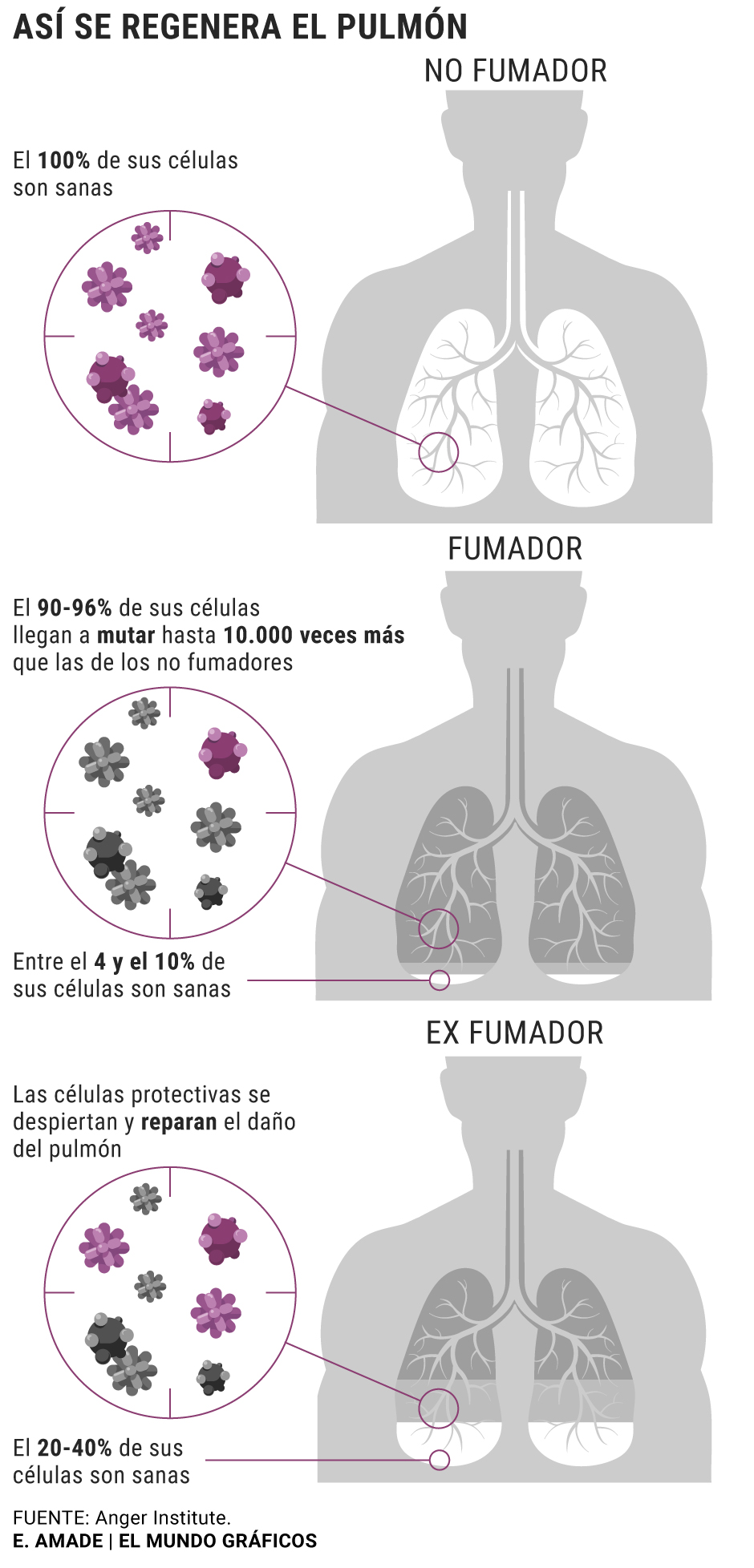- According to the WHO, the global consumption of tobacco among men for the first time
Quitting smoking not only prevents more damage to the lungs, it also helps the cells that protect our airways recover. And restoring the proportion of healthy cells in the respiratory epithelium helps reduce the risk of cancer, according to genetic research carried out by British scientists. The authors explain that ex-smoker cells have a lower risk of mutations and become carcinogenic, compared to those of people who continue to smoke.
The results underscore the benefits of quitting tobacco at any age. "People who have smoked for 30, 40 or more years often say that it is too late to quit, that the damage is already done , but our study shows that it is never too late," says Dr. Peter Campbell of the Wellcome Sanger Institute , first author of the work. "Some of the participants in the study had smoked more than 15,000 packages throughout their lives but a few years after quitting we saw that a large part of the cells lining their airways showed no trace of damage."
The research, whose details are published Wednesday in Nature , is part of a project to detect the mutational signatures behind lung cancer. These signatures are unique characteristics that take place in the DNA and that follow characteristic patterns. Scientists explain that understanding these mechanisms helps us understand some of the causes of the disease , as well as discovering new ones. This is the first major study on the genetic effects of tobacco in non-cancerous lung cells. In it, researchers have analyzed lung biopsies of 16 people, including smokers, ex-smokers, people who have never smoked and children.
From these biopsies they sequenced the DNA of 632 individual cells and observed the pattern of genetic changes in the cells. Thus, the researchers discovered that, despite not being cancerous, most of the lung cells of smokers had up to 10,000 additional genetic changes (mutations) compared to those of non-smokers. The damage in the DNA of the cells that line the lungs is what causes these genetic errors to appear; Over time the accumulation of mutations opens the door to an uncontrolled cell division and, with it, the risk of them becoming carcinogenic.
Watchmaking mini pumps
The authors point out that these mutations are caused by the chemicals in tobacco smoke. "Even the healthy lung cells of smokers contained thousands of genetic mutations," explains Dr. Kate Gowers, first author and researcher at the UCL, "and we know that these mutations are watchmaking minibombs waiting for a boost that pushes them into cancer." . According to scientists, the next step is an investigation with a larger population "to understand how cancer develops from these damaged lung cells."
The study also reveals that more than a quarter of damaged cells have at least one potentially carcinogenic mutation, which could explain why the risk of lung cancer is so high in people who smoke ( 86% of patients with Lung cancer are smokers or ex-smokers ). But to the surprise of the scientists, in people who had quit smoking, there were a considerable number of cells that covered the airways that had escaped damage, despite having smoked in the past. From the DNA point of view, these cells were similar to those of the
people who had never smoked: they had much less genetic damage from smoking and would have a low risk of becoming cancer. The researchers also discovered that ex-smokers had four times the number of healthy cells than people who still smoked.
Although the study reveals that those healthy lung cells may begin to repair lung epithelial cells in ex-smokers and that it helps protect them against lung cancer, the authors also remember that smoking also causes deeper lung damage that can cause Emphysema - chronic lung disease. And this damage is irreversible, even after quitting , they warn.
It is estimated that in the last quarter of the century more than half a million Spaniards have died from lung cancer. It is the variant of the disease that causes more victims per year in our country (22,000 in 2017, according to data from the National Statistics Institute), and every year more than 29,000 new cases are diagnosed. Last year, for the first time in history, lung cancer was ranked as the third most frequent in women, a fact that specialists have attributed to the increase in tobacco consumption.
According to the criteria of The Trust Project
Know more- Science and Health
- Graphics
- INE
Health The patient with coronavirus in Germany was infected by a Chinese colleague
Graphic report Australia: zero zone of climate change
ChinaWuhan's coronavirus now has six dead: China confirms contagion among humans

